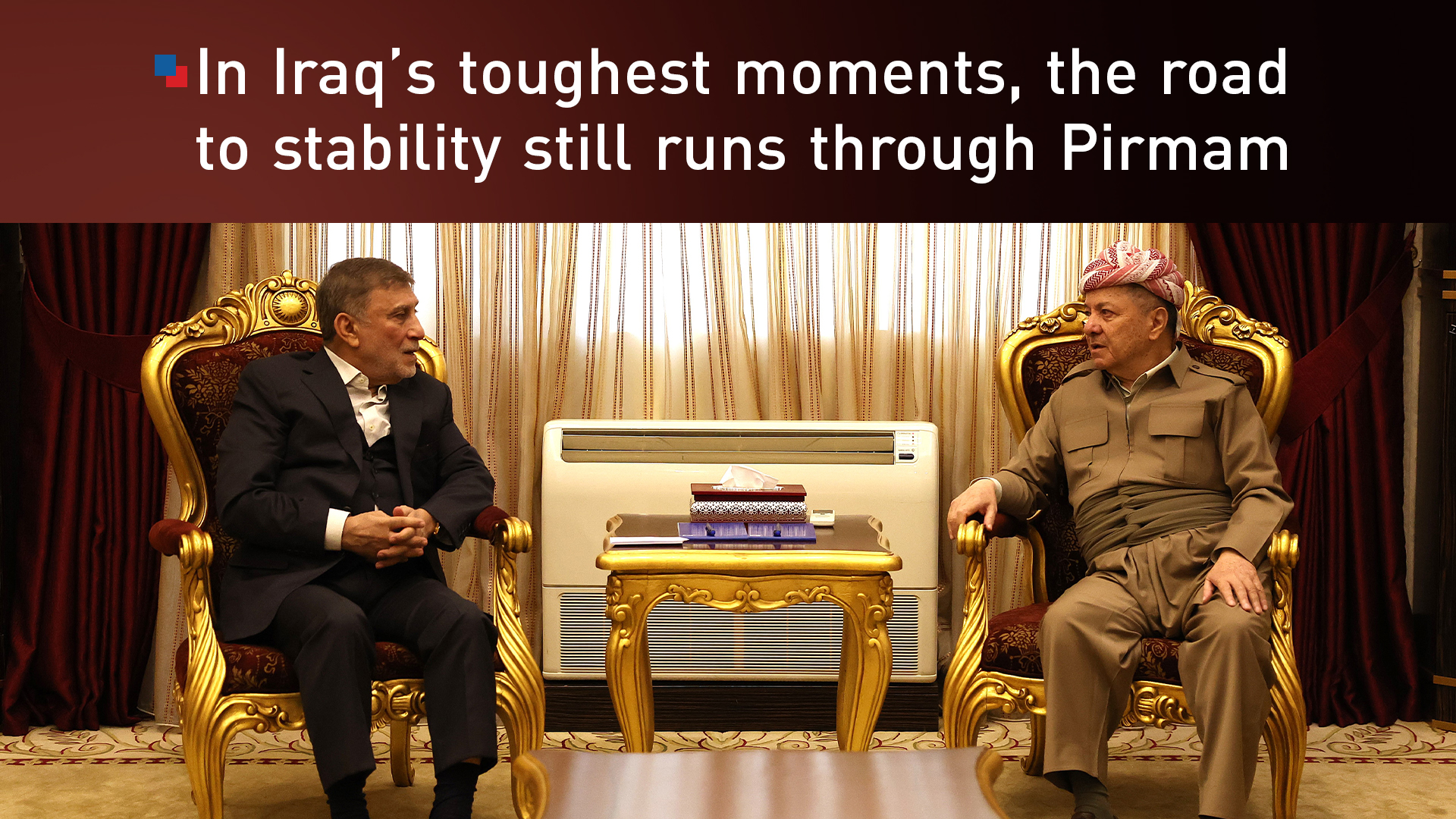President Masoud Barzani Receives Izzat Shabandar as Post-Election Consultations Accelerate in Iraq
With Iraq’s political future in flux, President Barzani emerges once again as the nation’s stabilizing force and a central broker of consensus.

ERBIL (Kurdistan24) — President Masoud Barzani on Monday received prominent Iraqi political figure Izzat Shabandar in Pirmam, Erbil, where the two discussed Iraq’s evolving political landscape and the broader regional situation following the country’s recent parliamentary elections.
According to a statement from President Barzani’s office, the meeting touched on the latest political developments, the results of the Iraqi parliamentary vote, and the crucial post-election phase now underway.
Barzani at the Center of Iraq’s Post-Election Diplomacy
Shabandar’s visit is the latest in a series of high-level meetings President Barzani has held in recent weeks with Iraq’s most influential political actors—an unmistakable sign of his pivotal role in shaping the country’s next governing coalition and safeguarding its political stability.
On Saturday, Barzani received former prime minister and leader of the State of Law Coalition, Nouri al-Maliki, in Erbil's Pirmam. Their meeting reviewed the election results, the path toward forming the next federal government, and the need to ensure that the vote’s outcome strengthens Iraq’s national stability.
Maliki later congratulated Barzani for the successful conduct of the elections and reaffirmed the importance of swiftly forming the next government to avoid the political paralysis that has plagued past cycles.
In the election, the Kurdistan Democratic Party (KDP), led by President Barzani, secured 27 seats with 1,109,297 votes, while Maliki’s State of Law Coalition won 29 seats with 728,446 votes—a balance that places Barzani at the heart of any viable path to government formation.
Barzani also met the Iraqi Prime Minister Mohammed Shia' al-Sudani on the sidelines of the MEPS 2025 forum in Duhok last week. Their discussions focused on election reforms, constitutional obligations, and strengthening cooperation between Baghdad and the Kurdistan Region.
Both leaders highlighted the peaceful conduct of the vote as evidence of Iraq’s growing political maturity.
On the sidelines of the same forum in Duhok, President Barzani met with Azm Alliance leader Muthanna al-Samarrai, who stressed the need for unity among Iraqi forces and the importance of placing the country’s interests above partisan divides.
Their meeting advanced ongoing negotiations between Kurdish and Sunni blocs—another key pillar of post-election consensus-building.
In a further demonstration of his broad engagement, Barzani also met Iraq’s Chief Justice Faiq Zaidan last week to discuss constitutional steps for convening the new parliament and forming the next government.
The meeting underscored the judiciary’s role in ensuring transparency and adherence to legal procedures.
President Barzani as Iraq’s Safety Valve
The series of high-level visits to Pirmam and Duhok—spanning Shiite, Sunni, federal, judicial, and regional leaders—reflects a long-standing political reality in Iraq: no stable Iraqi government can be formed without the support and partnership of President Masoud Barzani.
Across successive political cycles, Barzani has served as a national safety valve, mediating between rival blocs, defusing tensions, and guiding Iraq’s fractured parties toward compromise. His influence is rooted in several factors:
1: National Credibility: Barzani is widely regarded as one of Iraq’s most experienced statesmen, whose leadership during historic turning points—from the fall of Saddam Hussein to the war against ISIS—has earned him cross-sectarian respect.
2: Coalition-Building Power: Iraq’s major factions—Shiite, Sunni, and Kurdish—regularly look to Barzani as the central broker whose endorsement can unlock stalled negotiations and ensure the formation of a functioning federal cabinet.
3: Stability and Moderation: Barzani’s consistent calls for partnership, balance, coexistence, consensus, and constitutional governance position him as a moderating force amid Iraq’s frequent political crises.
4: Regional Trust: Barzani’s deep relationships with regional and international actors give him the ability to bridge local political divides with broader diplomatic support.
The intensified rounds of dialogue following the Nov. 11 elections—spanning Maliki, Sudani, Shabandar, Samarrai, Zaidan, and other key leaders—demonstrate that Iraq’s political map continues to center around Pirmam.
In a period marked by competing agendas, electoral disputes, and regional pressures, Barzani’s role remains indispensable.
As Iraq enters the critical stage of forming its next government, President Barzani once again stands at the crossroads of national decision-making—a stabilizing figure whose leadership is viewed by many as essential to maintaining Iraq’s unity, preventing political deadlock, and ensuring that the country moves toward a more secure and cooperative future.